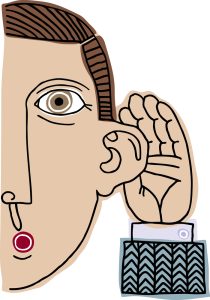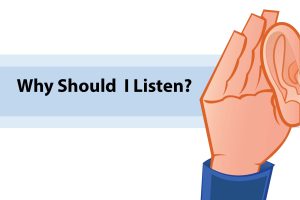Talking can get you in trouble. Listening can get you ahead.
Listening is an art form that improves with practice. As children, we know listening is essential in learning to function in the family, the group, and society. The problem comes into play when we have a role model that talks too much. Emulating them slows your career.
There is an old expression to help us remember the ratio of listening to talking, “We have two ears and one mouth, and we should listen and talk in the same ratio.” Remember, you cannot learn when you are talking. That may not be the exact expression, but it represents the guideline. Better yet, ask more questions when you talk so other people can talk more. Listen carefully, and they will tell you everything, even things they should never tell you.
Here is another technique to increase your power and prestige. When talking to someone, make three or four statements, and then ask a question. Give the other person a chance to speak to ensure you are understood.

The meaning of your communications is the response that you get.
If the response does not fit with what you are presenting,
change how or what you are presenting and ask more questions.
When people misunderstand the given information, it is worse than not giving it. It is a waste of your time and theirs. Always ask questions to make sure you are on track. That is why a large audience needs help understanding what the presenter is trying to say.
Some small pieces do not fit, and the mind chases that piece, losing track of the main points. PowerPoints make this even worse because the presenter knows the material but needs to consider the audience by asking for feedback.

Dean of the University of Massachusetts’ Worcester Medical School, Dr. Aaron Lazre, a prominent psychiatrist, teaches his new physicians the art of listening skills.
While the typical doctor interrupts their patient after only 18 seconds, the average patient takes 65 seconds to explain their problem fully. Research shows that an average patient has three symptoms that prompt them to schedule a doctor’s appointment. If the patient never has a chance to tell the doctor about their second or third symptom because the doctor has interrupted them at 18 seconds, the doctor may misdiagnose, and the results could prove fatal.
Dr. Lazre tells the physicians in his ‘listening classes’ that even listening for the full 65 seconds is not enough. When the patient has stopped talking, Dr. Lazre encourages the doctor to make eye contact with the patient and say, “Is there anything more?” Only by practicing these good listening skills can a doctor begin to know how to treat the various symptoms of his patient.
Companies suffer if their corporate culture fails to stress the importance of listening when responding to the needs and complaints of their customers. According to research released by Customer Care Measurement & Consulting:
-
- If a customer is unhappy about a product or service, 90% of unhappy customers tell their friends about a bad experience.
- 57% of them will take their business elsewhere
- An alarming 62% just want to vent or tell their side of the story
- 59% want an apology
- And only 52% want their money back.
 Listening gives you deep insight into how the other person processes information. They let their guard down when they share because they love to talk. The more questions you ask, the more they share, finally getting to the good stuff.
Listening gives you deep insight into how the other person processes information. They let their guard down when they share because they love to talk. The more questions you ask, the more they share, finally getting to the good stuff.
The reason women make better leaders is they are better listeners. With my male clients, the first step is to get them to ask more questions, listen carefully, ask more questions for clarification, and then respond as briefly as possible. Women do this naturally because they help each other and their families by listening.
Efficient leaders are excellent listeners. Their power comes from the knowledge they gain, carefully applying the information, and rewarding their people for jobs well done.
How can you become a better leader? Listen carefully, ask questions, and only give people enough information to ask for clarification. This process gives your people the authority to do their jobs best. They will do exactly that because you have shown that you trust them.
 You will achieve different results by doing anything different than you currently do. Guaranteed. See the rest of our website or follow us on LinkedIn for more tips and tricks.
You will achieve different results by doing anything different than you currently do. Guaranteed. See the rest of our website or follow us on LinkedIn for more tips and tricks.
Contact me if you want more suggestions on how to reap bigger rewards. Or, if you really want to increase the size of your rewards quickly, hire me as your coach.
Sign up for your FREE introductory call and your first FREE COACHING SESSION with Colle Davis! 804-467-1536 EST

